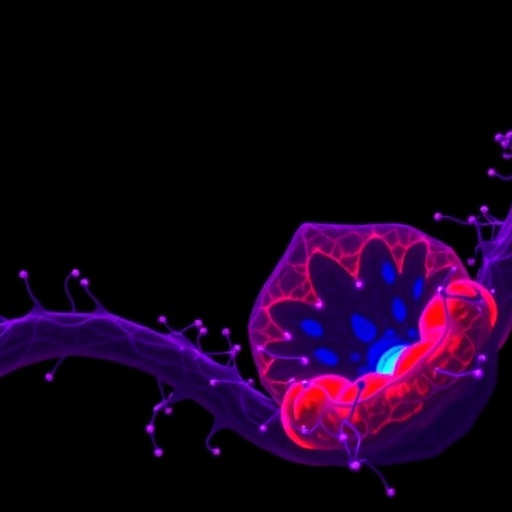In a groundbreaking study published in Medical Oncology, researchers have unveiled compelling evidence that mutations in the splicing factor gene U2AF1 exert profound effects on erythroid differentiation and modulate cellular sensitivity to DNA demethylation therapies. This discovery could revolutionize therapeutic approaches to hematological malignancies, especially those characterized by aberrant splicing and epigenetic dysregulation. The research comes at a critical juncture, where precision medicine increasingly focuses on the interplay between genetic mutations and epigenetic modifiers in blood cell development and malignancy progression.
The U2AF1 gene encodes a crucial component of the spliceosome, the cellular machinery responsible for precise RNA splicing—a process that edits pre-messenger RNA into mature transcripts required for correct protein synthesis. Mutations in U2AF1 have been recurrently identified in hematopoietic cancers, notably in myelodysplastic syndromes (MDS) and acute myeloid leukemia (AML). Yet, the mechanistic consequences of these mutations on erythropoiesis, the formation of red blood cells, and their influence on drug responsiveness, remained incompletely understood until now.
This latest research utilized an integrative approach combining cellular, molecular, and pharmacological analyses to decipher how mutant U2AF1 disrupts erythroid lineage commitment. The team employed in vitro erythroid differentiation models derived from human hematopoietic stem and progenitor cells (HSPCs) harboring either wild-type or mutated U2AF1, enabling a side-by-side comparison of differentiation kinetics and molecular phenotypes. Remarkably, cells with U2AF1 mutations exhibited compromised maturation into functional erythrocytes, underscoring a block in erythroid differentiation.
Delving deeper, transcriptomic and splicing analyses revealed widespread alterations in RNA splicing fidelity in U2AF1-mutant cells. Key erythropoiesis regulators, including transcription factors and signaling molecules, underwent aberrant splicing, resulting in truncated or nonfunctional protein isoforms. This splicing dysregulation provides a molecular explanation for the impaired erythroid differentiation observed, illustrating how mutations within splicing machinery components can ripple through gene networks to derail normal blood cell development.
In addition to mechanistic insights, the study breaks new ground by exploring therapeutic implications. The researchers assessed the sensitivity of U2AF1-mutant erythroid precursors to DNA demethylation agents—a class of epigenetic drugs known to reverse aberrant methylation marks commonly found in hematological cancers. Intriguingly, mutant cells demonstrated heightened susceptibility to these demethylating drugs, such as azacitidine and decitabine, suggesting an exploitable vulnerability in U2AF1-driven disease contexts.
This enhanced drug sensitivity possibly stems from epigenetic crosstalk, where splicing abnormalities induced by mutant U2AF1 catalyze specific DNA methylation patterns or chromatin changes that sensitize cells to demethylating agents. The study’s demonstration that pharmacological intervention can partially restore defective erythroid differentiation augurs well for clinical translation, potentially guiding more effective, mutation-specific therapies for patients bearing U2AF1 alterations.
The findings also bear significance for understanding disease heterogeneity among patients with splicing factor mutations. It suggests that stratification based on U2AF1 mutation status and corresponding epigenetic landscapes could refine treatment regimens, maximizing therapeutic benefits while minimizing unnecessary toxicity. Personalized medicine approaches grounded in such molecular profiling are rapidly becoming the cornerstone of modern oncology.
Importantly, by dissecting the intersection between RNA splicing dysregulation and epigenetic modulation, this research opens multiple avenues for drug discovery. Targeting the spliceosome directly remains challenging due to potential toxicity; however, leveraging downstream vulnerabilities like altered epigenetic states could herald safer and more effective treatments. The observation that demethylating agents can re-sensitize mutant cells to differentiation cues is particularly encouraging.
Moreover, the study highlights the intricate balance required for proper erythropoiesis, a process exquisitely sensitive to genetic and epigenetic perturbations. Impairment of red blood cell production manifests clinically as anemia and other cytopenias, common features in myeloid malignancies that significantly impact patient quality of life. Therapeutic strategies capable of restoring erythroid function represent a critical unmet need.
Future research inspired by these findings will likely focus on delineating the exact molecular pathways linking U2AF1 mutations to specific DNA methylation changes. High-resolution epigenomic profiling and single-cell RNA sequencing may illuminate heterogeneity within the mutant erythroid population, revealing subclones with distinct drug sensitivities. Such investigations will be crucial to designing combinatorial therapies.
It is also conceivable that other spliceosome mutations found in hematopoietic cancers exert similar effects on differentiation and drug response. Hence, this study sets a precedent for investigating the broader impact of splicing alterations beyond U2AF1, potentially extending therapeutic insights across a spectrum of myeloid disorders. The convergence of splicing and epigenetics emerges as a fertile ground for research innovation.
Furthermore, this work underscores the importance of integrating functional genomics with pharmacology to unravel disease complexity. By complementing genetic analyses with phenotypic drug sensitivity assays, researchers can move beyond descriptive studies to actionable strategies. This bench-to-bedside approach exemplifies modern translational oncology’s ethos.
Clinically, given the already approved status of several demethylating agents, these findings could expedite the refinement of clinical trials targeting U2AF1-mutant patient subsets. Biomarkers derived from splicing or methylation profiles could serve as companion diagnostics, enhancing patient selection precision. Moreover, understanding the limitations and potential resistance mechanisms to demethylation therapy remains an important concern.
Taken together, this research not only deepens our comprehension of how spliceosome mutations perturb erythropoiesis at a molecular level but also charts promising paths towards tailored interventions. Such advancements are particularly vital in blood cancers, where despite therapeutic progress, outcomes for many patients remain suboptimal.
At its core, the study by Liu, Li, Wang, and colleagues reaffirms the complex interplay between genetic drivers and epigenetic landscapes in shaping cancer behavior and treatment responses. As science continues to decode these multifaceted relationships, the prospect of truly individualized medicine comes more sharply into focus—offering hope for improved patient care and durable remissions in challenging hematologic malignancies.
Subject of Research: The impact of U2AF1 gene mutations on erythroid differentiation and sensitivity to DNA demethylation drug treatments in hematopoietic cells.
Article Title: The effect of U2AF1 mutation on erythroid differentiation and sensitivity to demethylation drug treatment.
Article References:
Liu, Y., Li, X., Wang, H. et al. The effect of U2AF1 mutation on erythroid differentiation and sensitivity to demethylation drug treatment. Med Oncol 42, 459 (2025). https://doi.org/10.1007/s12032-025-02956-2
Image Credits: AI Generated




